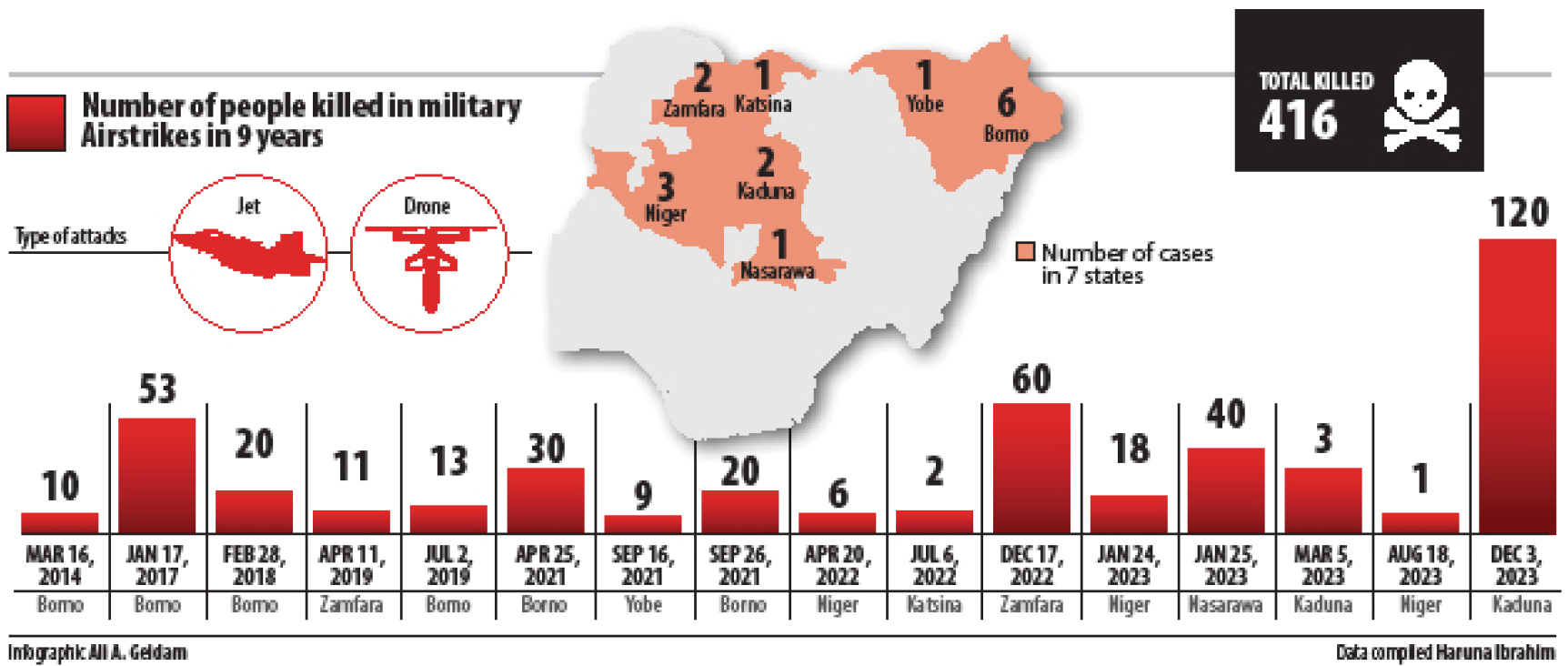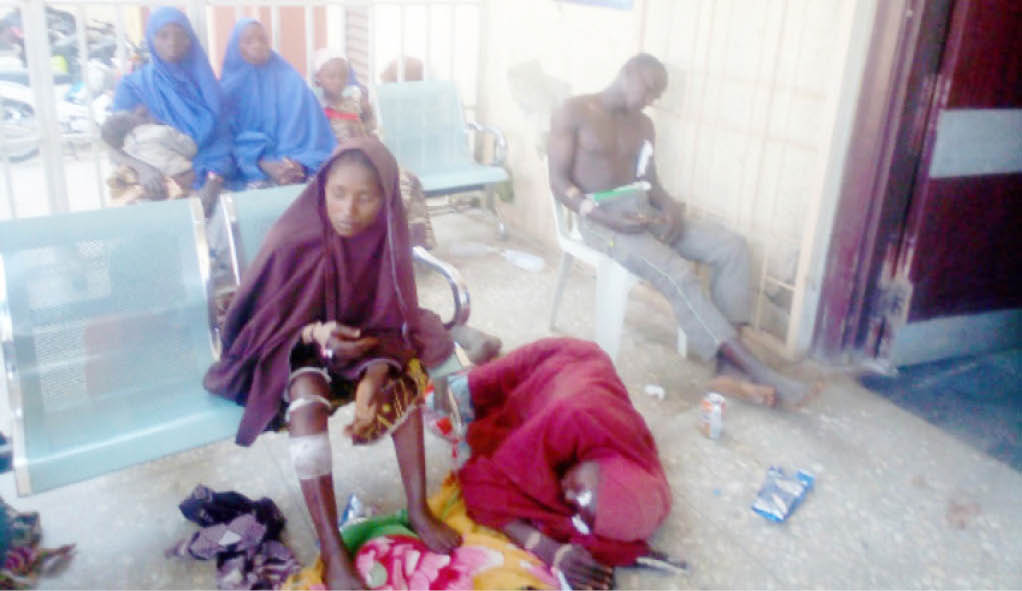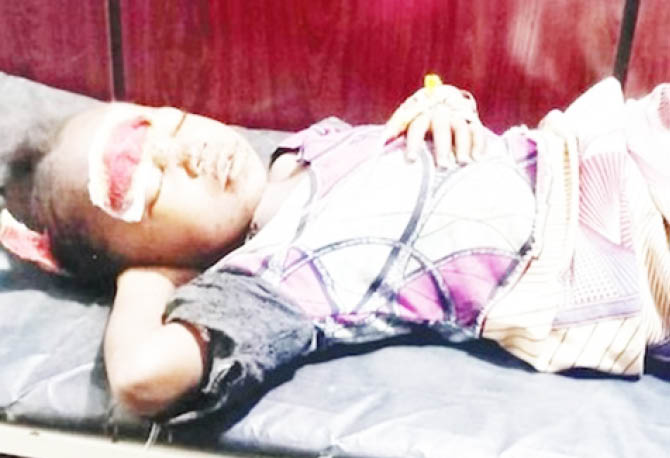Inside military’s 16 airstrike ‘errors’ on citizens in 9 years
No fewer than 416 unarmed citizens have been killed by accidental airstrikes of the Nigerian military within the space of 9 years in 16 communities located in the northern region of the country, findings by Daily Trust Saturday have revealed. Although the military high command and the Nigerian Air Force had consistently maintained that there […]

Inside military’s 16 airstrike ‘errors’ on citizens in 9 years
No fewer than 416 unarmed citizens have been killed by accidental airstrikes of the Nigerian military within the space of 9 years in 16 communities located in the northern region of the country, findings by Daily Trust Saturday have revealed.
Although the military high command and the Nigerian Air Force had consistently maintained that there was no way collateral damage won’t occur at a time an asymmetric warfare is ongoing, stakeholders disagreed, saying many of the cases were avoidable.
The stakeholders, who spoke on different incidents, argued that collateral damage happened when there is crossfire between the troops of the military on warfront and the enemies, noting that such situations are understandable.
They also maintained that the number of casualties involved won’t be of that magnitude if the troops had carried out their intelligence and operations as expected.
Kaduna massacre: US to help Nigerian military reduce accidental bombing
Oil theft: Tantita dismisses Navy’s collusion allegation
Dates of incidents compiled from reported cases between 2014 and 2023 showed that many innocent children and women top the number of casualties, a development several organisations like Amnesty International, Human Rights Watch among others have condemned.
Further findings showed that such number of innocent souls killed in ‘error’ by military airstrikes as tracked by Daily Trust Saturday, excluded unreported cases. This because they took place in remote locations and went unreported by the media.
Specifically, on March 16, 2014, at least 10 innocent citizens lost their lives in Kayamla village of Borno State when airstrikes targeting terrorists misfired.
Almost 3 years after the Kayamla village incident, precisely on January 17, 2017, 53 internally displaced persons were struck dead by the same military airstrikes at Rann camp, also in Borno State. Some international organisation put the death figure at 115 and more than 100 injured.
Similarly, Daglun community in Borno lost 20 civilians on February 28, 2018 to the same type of airstrikes.
In Zamfara, North West region of the country, in Ajia community, located at Birnin Magaji Local Government Area of the state, no fewer than 11 persons lost their lives to the same military airstrikes on April 11, 2019.

The data also revealed that in Gajigana village and Mainok, all in Borno State, on July 2, 2019 and April 25, 2021 recorded 13 civilian casualties and 30 soldiers respectively due airstrikes from the troops of the Nigerian Air Force.
In the same vein, on September 16, 2021, nine farmers were struck dead in Buwari village in Yobe State by air troops going after terrorists in the area, while 20 fishermen at Kwatar Daban Mascara in Borno State also lost their lives on September 26, the same year.
Further checks showed that six children were among the casualties recorded at Kuragba community, Shiroro Local Government Area of Niger State on April 20 last year, while two casualties were recorded on July 6, the same year at Kunkunni village, Safana Local Government Area of Katsina State, due to airstrike.
At least, 60 people were also struck dead on December 17 last year at Mutunji community, Dausadau Emirate in Maru Local Government Area of Zamfara State.
In the North Central region, 18 and 40 persons were lost in Galkogo community, Shiroro Local Government Area of Niger State, and Rukubi community, Doma Local Government Area of Nasarawa State on January 24 and 25 respectively.
Before the latest Tundun Biri incident, it was also reported that one woman was killed in an airstrike at Kwaki village, Shiroro Local Government Area of Niger State in August this year, while three people were also killed on March 3 at Sabon Gida village, Fatika district Giwa of Kaduna State.
Pay compensation to victims on time, expert tells FG, military
Commenting on the different cases that happened, an intelligence and security expert, Abubakar Umar Garba, advised the federal government to hasten up payment of compensation to victims of Kaduna bombing.
Garba noted that doing so as soon as possible would, to a certain extent, assuage the suffering and grief of the relatives of the victims, describing the incident as disheartening.
“Inasmuch as the deed is already done, the federal government and the military high command should not pay lip-service to the compensation matter they talked about. They should do everything possible to ensure that it is timely, to avoid unwarranted occurrences.
“I want to also counsel them to let this type of incident be the last because if this continues, it may snowball to what all of us are not praying for,” he told Daily Trust Saturday in a telephone interview.
Learn from your errors, military cautioned
On his part, a security sector reform expert, Chukwuma Ume, cautioned the military high command not to always sweep this type of incident under the carpet.
He argued that it is imperative that the military learnt from the error by conducting a full enquiry, a post-mortem analysis and bring a certain innovation into the armed forces.
“The truth of the matter is that it is not peculiar to Nigeria. Let’s establish that. It can happen anywhere. The issue is: If it happens, is there a denial or acceptance? From what is on ground, there is an acceptance on the part of the Nigerian Army.
“It is like heaven is a deep-blue sea, to strike or not to strike. Remember the one that happened in Nasarawa. When they see people in the bush in large numbers, at times they want to be pre-emptive and they will strike, only for them to realise that they have struck the wrong people.
“The solution to incidents like that is what they were being told during training, which is to be precise in their intelligence gathering, and to triangulate it.
“Our problem here in Nigeria is that if it happens, we will talk about it for one week, two weeks, and we will sweep it under the carpet. This should be an opportunity for them to review air operations and try to fine-tune it.”
In a statement on December 6 shortly after the Kaduna incident, the United Nations (UN) Human Rights Office spokesperson, Seif Magango noted, “While we note that the authorities have termed the civilian deaths as accidental, we call on them to take all feasible steps in the future to ensure that civilians and civilian infrastructure are protected in consistence with Nigeria’s international law obligations.
“They must review the rules of engagement and standard operating procedures to ensure that such incidents do not happen again.
“We are particularly alarmed by reports that the strike was based on the “pattern of activities” of those at the scene, which was wrongly analysed and misinterpreted. There are serious concerns as to whether the so-called “pattern of life” strikes sufficiently comply with international law.
“We urge the Nigerian authorities to thoroughly and impartially investigate all alleged violations of international human rights and international humanitarian law, including deaths and injuries from air force strikes, and hold those found responsible to account. The government should also provide victims of any unlawful strikes and their families with adequate reparations,” he said.
Mukhtar Ismail, another security expert, lamented that the Nigerian government rarely fulfills its promises.
“Is there any record that all the victims that die as a result of airstrike in the last 10 years have been compensated in line with global best practices? I don’t think so.
“In most cases, families of victims only get foodstuff and peanuts and that is all. They are mostly left to continue licking their wounds, and this is not the way to go. There must be compensation; there must be empathy. They should be made to believe that indeed, the attacks were not deliberate.
“President Tinubu should empanel a committee and revisit all previous cases of ill-fated airstrikes against innocent civilians, and they should be compensated,” he said.
Apart from calls for reparation by prominent northern groups like the Northern Elders Forum (NEF), the Jama’atu Nasril Islam, Fityanul Islam, among other notable voices, the Arewa Consultative Forum, on Thursday, demanded the removal of the General Officer Commanding One Division of the Nigerian Army, Kaduna, Major-General V.U. Okoro over the accidental bombing of Tudun Biri.
In a statement issued by its national publicity secretary, Prof Tukur Muhammad, the ACF called for the removal of some army officers in Kaduna to ensure thorough investigation.
It stated, “The General Officer Commanding One Division of the Nigerian Army, Kaduna, along with his immediate subordinate officers, should be redeployed to allow for unfettered investigation.
“As a trite principle of justice, One Division of the Nigerian Army must not, and should not be allowed to investigate itself. An independent panel of investigators is clearly indicated. Further, the results of the investigation must be made public, issues that border on national security considerations excepted.
“The defence headquarters should retract its needless statement. The Ministry of Defence and the Armed Forces in particular should take steps to ensure that such incidents are avoided or contained to the barest minimum humanly possible.
“The federal government must take responsibility for full compensation to all victims of Tudun Biri. The gesture should also be extended to victims from all previous such incidents.”
Recall that Vice President Kashim Shettima, who was in Kaduna on Thursday on behalf of President Bola Tinubu, had said that the government would get to the root of the incident.
“All measures will be taken to ensure that future occurrences are averted. The government will go to the root of the issue and anyone found culpable will be punished accordingly,” he had said.
